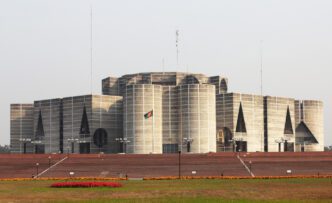Executive Summary
The Story So Far
Why This Matters
Who Thinks What?
A delegation from the European Parliament’s Subcommittee on Human Rights has urged Bangladesh’s political parties to demonstrate a peaceful commitment to democratic reforms following a recent visit to the country. The report, presented at the European Parliament office in Strasbourg, France, emphasized support for Bangladesh’s ongoing democratic transition while also drawing critical attention to the humanitarian crisis facing Rohingya refugees in Cox’s Bazar.
EU Delegation’s Findings
Munir Satori, head of the delegation, explained that their mission had a twofold objective: to support the reform agenda of Bangladesh’s interim government and to promote human rights as central to EU-Bangladesh relations during the democratic transition. The delegation also aimed to spotlight the often-overlooked plight of Rohingya refugees in Cox’s Bazar, the world’s largest refugee camp.
While the delegation welcomed the interim government’s efforts to uphold human rights, they acknowledged persistent challenges in several areas. The report expressed support for the ongoing work of Bangladeshi civil society in addressing these issues.
Bangladesh’s Democratic Trajectory
Delegation member Isabel Wiseler-Santos Lima observed that Bangladesh presents a contrasting example in a world where democracy is globally receding. She noted the country’s earnest attempts to overhaul its democratic system and expressed hope that upcoming elections would be held transparently and credibly, as indicated by the interim government.
Catarina Vieira, another delegation member, highlighted Bangladesh’s pivotal historical moment, presenting an opportunity for significant progress. She reported widespread calls for transparent, inclusive, and credible democratic processes from political actors, students, youth movements, and civil society.
However, Vieira also expressed regret that minorities, including LGBTQI groups, religious minorities, indigenous communities, and women, were sometimes underrepresented in these processes. She identified this as a crucial area for improvement in shaping Bangladeshi society.
The Rohingya Refugee Crisis
Wiseler-Santos Lima underscored the forgotten nature of the Rohingya crisis, overshadowed by other global conflicts in Ukraine and Gaza. She stressed that Myanmar’s refusal to accept responsibility leaves refugees in limbo, with Bangladesh, a self-described poor country, unable to bear the burden alone.
Arkadiusz Mularczyk, another delegate, expressed surprise at the limited commitment from Muslim states and India towards the Rohingya. He noted that European states and the European Union are currently the largest aid donors, urging Muslim states and India to take greater responsibility as major stakeholders in the region.
Catarina Vieira conveyed deep alarm over the humanitarian crisis in the Rohingya camps, particularly the consequences of cuts in humanitarian aid. She cited reduced food rations, limited access to education for children, and a lack of safe spaces for women as deeply concerning, urging the EU to step up its donor role and political leadership.
EU’s Constructive Role and Future Steps
Vieira asserted that the European Union can play a constructive role by supporting democratic structures, encouraging reforms, and standing in solidarity with those working for a better future in Bangladesh. She emphasized that despite a global democratic backlash, there is reason for hope, provided the international community offers support.
Vieira also expressed her intention to collaborate with colleagues in the European Parliament, the TWA secretariat, and the European Commission on follow-up actions. These efforts will focus on supporting democratic reforms, protecting human rights defenders, and addressing the humanitarian crisis in Bangladesh and Myanmar.
Background to the Visit
The five-member delegation of the European Parliament’s Subcommittee on Human Rights visited Bangladesh from September 16 to 18. During their visit, they engaged with representatives from the interim government, political parties, non-governmental organizations, civil society groups, labor representatives, and multilateral agencies. The delegation also conducted a field visit to the Rohingya refugee camps in Cox’s Bazar.








